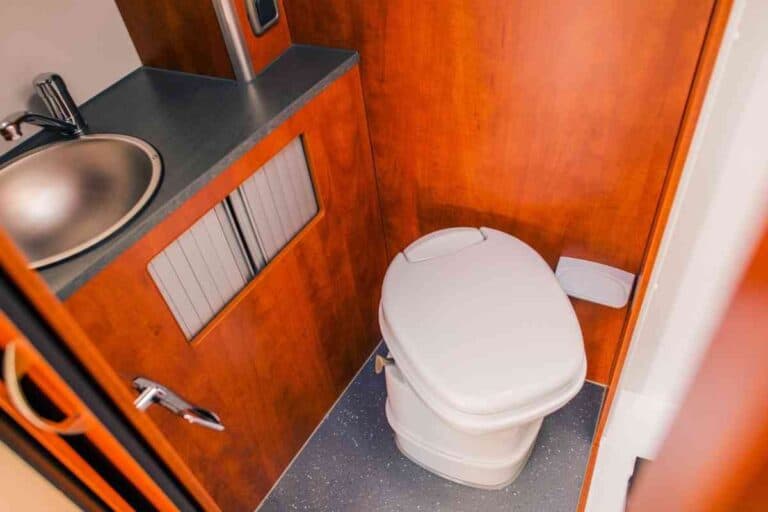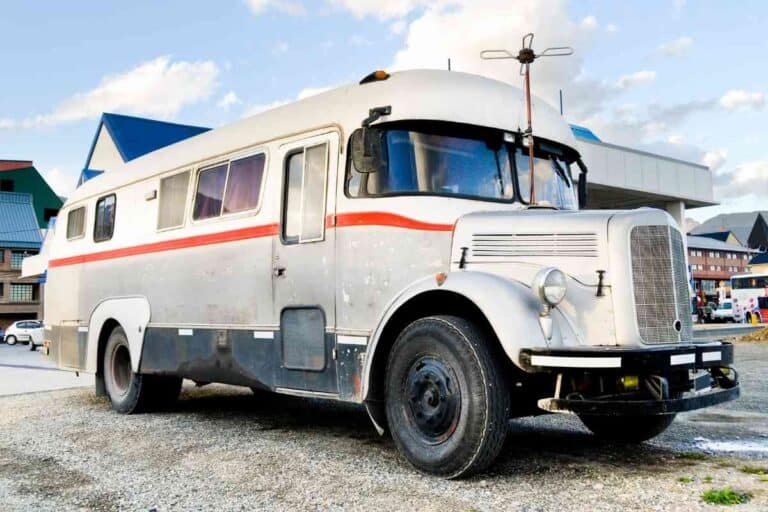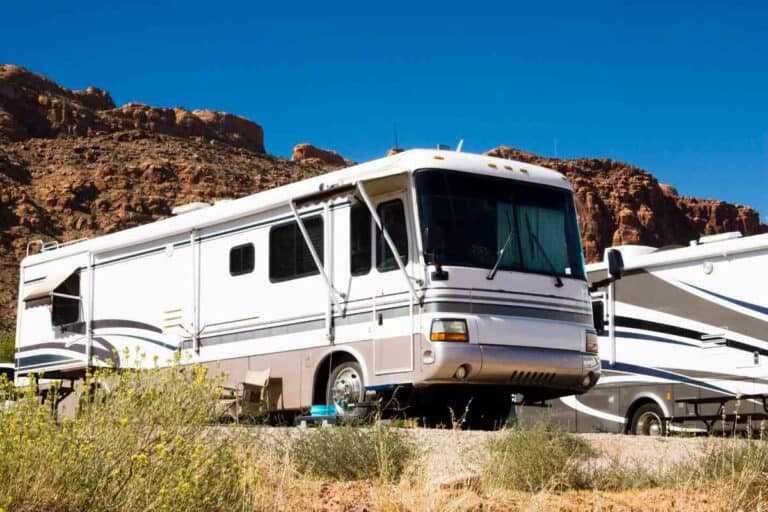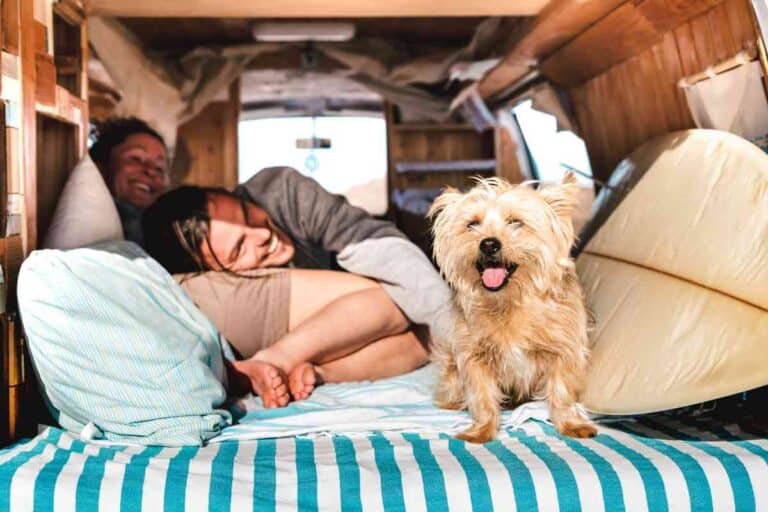Is it Cheaper to Live in an RV? Let’s Break it Down
The nomadic lifestyle is widely appealing. People wanting to break out of the mold and take life on their terms often gravitate towards RVs to meet their needs. It can also be much cheaper to live in an RV when compared to a house in the suburbs.
Living in an RV can be much less expensive than living in a house or apartment. Even considering gas, food, and other expenses, living in an RV can cause your monthly budget to shed hundreds of dollars. Most of the savings associated with RV living depend on the type of RV, where you park, and how you balance your finances.
Let’s talk about how living in an RV presents its unique challenges and benefits. We’ll also take a look at the monthly expenses associated with RV living as they compare to living in a house or apartment.
How Much Does It Cost to Live in an RV?
RV living carries many of the same costs as living in a stationary home. For the most part, you won’t be cutting any major bills, only relocating those funds to different parts of the budget. Still, the bills you do have can drastically decrease.
| Expense | Average Household Spending | Average RV Living Spending |
| Housing | $1,483 | $450 – $1300 |
| Transportation | $756 | See Above |
| Utilities | $245 | $30 |
| Gas | $127 | $700 – $1000 |
| Insurance | $93 | $85 – $135 |
| Food | $618 | $400 – $800 |
| Entertainment | $227 | $300 |
| Cable/Internet | $99 | $60 |
| TOTAL | $3,648 | $2,025 – $3,625 |
Average household spending figures are courtesy of Bank of America. RV spending figures are courtesy of Wand’rly Magazine and Gone with the Wynns.
You may notice that there is a lot of variation on how much it can cost you to live in an RV. That’s because there are so many factors that play into how much you spend. For example, if you own an RV, you may not pay anything for housing each month (but will still pay campground fees).
Similarly, if you plan on moving the RV once a week, you probably won’t be spending $1,000 on gas unless you’re driving great distances.
Essentially, many of the averages listed here are variable and can be controlled when you live in an RV. It can cost much less to live the nomadic lifestyle this way, or it can cost roughly the same as you pay now – just with a different budget structure and amazing views.
Let’s break down some of these costs and how you can decide how much to spend in each of these categories. With the number of special considerations, there is no one solution or answer for everyone who wants to live the RV lifestyle.
The Cost of the RV
One of the biggest factors that can influence the cost of living in an RV is the RV itself. There are multiple ways to get your hands on an RV, but as we’ve seen above, some end up being much more expensive than others.
- Rental. You can rent an RV between April and October, but good luck finding a location that charges by the month. Most RV rentals charge per night, which can get expensive very quickly. Some locations rent RVs in November-March as well, and rates are much less expensive during the off-season.
While it may seem cheaper to rent an RV at first, financing your own RV can be more cost-effective in the long run.
- Financing an RV. Just like buying a car or a house, you can buy a new or used RV and make monthly payments. It’s probably best to rent an RV first to see if it’s your thing. Monthly payments on even a new RV may not be as expensive as your rent or mortgage payment.
Financing a new or used RV can spread the cost out over some time, which can help save money in the short-term.
- Buying an RV. If you have enough saved up, you can easily purchase used RVs in much the same way you would a used car. Prices vary by owner but expect to spend a few thousand dollars at the very least. A used RV may also require some repairs or renovations, so remember to factor those expenses into your budget.
Buying your own used RV outright can be the cheapest option if you find a good deal. Consider that you won’t have to make monthly payments, but instead pay the entire cost of the RV upfront.
This is perhaps the largest influencing factor when we talk about how much cheaper it can be to live in an RV. The choice of spending money now or spending money over time can very much affect how much you spend per month. Your bottom line is very much affected by this decision.
The Question of Fuel
It’s a common misconception that fuel costs skyrocket when living in an RV. Of course, RVs don’t get the best gas mileage. You will have to fill up the tank more often. Depending on where and when you travel, the costs can add up.
But this misconception often stems from the idea that you’ll be driving the RV all day every day, which simply isn’t the case. Most people find a place to park their RV (as we’ll discuss below) and stay there for days at a time.
Consider this: If you work outside of your home, you probably need to commute at least five days a week. When you live in an RV, you could stay in the same spot for a week or two and not use any gas at all. Some people even tow their cars with them to go see local attractions and make supply runs, and the car will get a lot better gas mileage than the RV.
That isn’t to say that gas is cheap. You will spend a fair bit on fuel when you are living the nomad life, but not nearly as much as some people believe.
Where You Park Matters
There are several different places you can choose to park your RV. Some of them can get expensive if you plan on staying for longer periods, but there are free locations to park for the night as well.
You may be able to find free overnight parking in school parking lots (on weekends and when school is not in session), large store parking lots, and truck stops. Make sure that it’s safe and legal to park where you are – looking for other RVs and semi-trucks in the same area can be a good way to figure out where you can and cannot park your rig.
‘Boondocking’ is another option for some RVers. The Bureau of Land Management often has sprawling wilderness where RVers can park for free, but make sure that it’s safe. There are no amenities, no dumpsites, or protection of any kind. Boondock at your own risk.
On the other hand, setting up at a campground is associated with various costs. There is a nightly fee for parking at the campground and additional fees for accessing amenities such as water and electricity hookups. National and State Parks are often less expensive, while privately owned campgrounds and RV Parks can vary wildly.
| Type of Campground | Average Nightly Fees |
| RV Parks | $30 |
| Public Campgrounds (KoA) | $35 – $60 |
| National or State Park | $20 |
| Boondocking | $0 |
| Parking Lot | $0 |
Insurance
You pay insurance fees for your car and your home, right? An RV is both of these things, so you can reasonably expect to pay insurance fees as well. Make sure that you shop around for the best RV insurance before committing, just like you would with car insurance.
Home insurance may not be required (especially if you’re renting), but you must pay for insurance on your RV. Think of it like insuring your car: to legally drive it, you have to have it insured. The same is true for your RV.
For towable RVs, like fifth wheels and travel trailers, insurance is not mandatory, and liability is covered by your towing vehicle.
Many people may forget or overlook insurance fees as part of the cost of living in an RV, but it’s an important thing to consider.
Expenses You May Have Forgotten
It’s easy to forget about everyday fees and expenses. There seems to be a mindset among aspiring RVers that RV Living removes most of these costs, but that simply isn’t the case. Here, we’ll take a look at some of the average costs that get overlooked when people consider living in an RV.
| Type of Expense | Average Monthly Cost |
| Laundry | $20 – $80 |
| Food | $300 – $800 |
| Internet/Phone Access | $60 |
| Repairs | $120 |
| Outdoor Gear | $200 – $400 |
| Entertainment | $200 – $400 |
| Park Passes | $80 – $220 |
- Laundry. You’ll still need to wash your clothes while you’re living in an RV, of course. Some RVs come with washer/dryer hookups or even the machines themselves. You’ll still have to pay for water hookup access and dumping the greywater.
If you don’t have a washer or dryer in your RV, you’ll have to use public laundromats to wash your clothes. It can be fairly inexpensive, but it does take time and planning to get the laundry done this way. You will also have to have quarters on hand, or cash to make the change.
- Food. You still have to eat. Most RVs have refrigerators where you can store groceries, so you may not pay more than you’d expect to pay at home. If your RV doesn’t have a fridge (or doesn’t have a cooking surface), you may need to stop at restaurants to eat during the day. Depending on your RV situation and what you choose to do, your food bill may be more expensive while you live in an RV.
- Internet/Phone Access. Whether you’re using it for work or play, having access to the internet is invaluable. The internet can help you plan your routes, find campsites, and research prices for your next overnight stop. If you’re working remotely, access to the internet means that you get to continue making money while you live in an RV.
Options for internet access include hotspots through your mobile provider, WiFi at certain campgrounds, and libraries with free internet access. It depends on where you want to work and how much you are willing to pay for the convenience. - Repairs. Think of all the repairs you’ve had to make to your car in the last year, and how much you’ve had to fix in your home. Put them together and you have just about the amount you can expect to pay to repair your RV.
Several factors may influence this amount. The biggest is your RV itself. A new RV probably won’t have much more than routine maintenance to do. A used RV can have a host of problems. Usually, the less you pay for the RV, the more you’ll have to pay to repair and maintain it in the long run.
Consider that your RV will need a specialized mechanic and repairs are often more expensive as well. - Outdoor Gear. You may not need a tent, but that doesn’t mean you won’t need other outdoor gear. If you want to hike during the day, you’ll need the standard gear: hiking boots, a hiking backpack, poles, a canteen or water purifier bottle, and more. That’s just one example.
Even while traveling and living in an RV, outdoor gear can be a huge investment. If you don’t have any of this stuff, you can expect to drop a ton of money, in the beginning, to get started. - Entertainment. At home, ‘entertainment’ usually covers the cable bill, internet streaming services, video games, and more. While you can reasonably do all of these things on your RV, we’re talking more about location-specific entertainment.
Say you want to see the local sights. Museums and other attractions likely have entry fees, so you’ll have to pay if you want to experience them. Souvenirs are an additional entertainment expense. These are fees you wouldn’t normally pay at home. Factor entertainment fees into your RV Living budget. - National and State Park Pass. National and State Parks are some of the best places to park your RV. They are generally less expensive than RV parks, and most have spaces with hookups. There are yearly passes you can buy for most national parks or passes that allow you to access all national parks in the country for a fee.
Some states also sell yearly park passes that allow you to park and camp for a discount (or for free) at their parks and certain locations. These passes can save you a lot of money elsewhere but expect to pay a lot upfront to obtain them.
The Annual ‘America the Beautiful’ pass, for example, costs $80. To buy an Annual State Park Pass for New Mexico alone, it can be between $180 – $225.
If you like fishing, you may also need fishing licenses for the states you’ll be visiting. Many locations have temporary fishing passes that allow you a few days of fishing privileges for a fee, so consider this as well.
Further Considerations
Living the RV lifestyle presents unique challenges. Not all of them are related to expenses.
How will you work? How will you receive your mail? There are a lot of things to consider when you begin living nomadically, and this is just the tip of the iceberg.
You’ll have to get a storage unit or store your things at a trusted friend or family members’ house if you have possessions you aren’t taking with you. Do you want to tow your car behind your RV, or rent a car at each location where you need one? Expenses can vary for these options.
Having a stationary PO box may be a good idea but swinging through to check it can be a pain. If you can work remotely with your job, make sure that you have access to the internet or other work requirements during the hours you’ll be working.
All these factors have to be considered before you can decide to live in an RV full time and working out the semantics can be tough! Thankfully, there are a ton of online resources from people who live this lifestyle. A simple search can help you plan your nomadic RV life.
In Summary
Living in an RV may not be as cheap as you imagine, but you can still expect to save a few hundred dollars a month on average.
Besides, there are many variations from those averages which can move your particular budget significantly in either direction. Different factors about the RV, your lifestyle, and how you choose to spend your time will influence how much cheaper it is to live in an RV.
Of course, living in an RV isn’t for everyone and that’s okay! You can save money, but some sacrifices need to be made and a lot of work goes into living in an RV full time.






